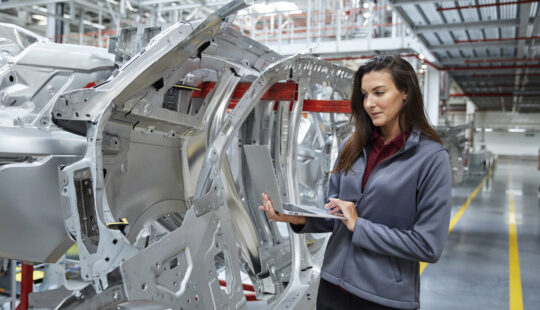Waste management has never been so attractive. First, there is excitement around opportunities to reduce, reuse, and recycle — saving resources, creating new jobs, and protecting our planet. And thanks to digital technology, there is also an unprecedented chance to trace its path to determine exactly how it could create economic and societal value.
Globally, we generate more than 2 billion tons of trash per year, far more than we can fully process or recycle. While the will to become more circular already exists in many enterprises and organizations, making it happen can be hard. Many places lack proper waste infrastructure, recycling technology still is not good enough, and — most importantly — we have been using outdated business models to meet the needs of an expanding middle class that wants to buy more stuff.
The current “take, make, use, dispose” model must go, and there must be an efficient solution to designing out, collecting, and re-purposing waste that otherwise ends up in the ocean, in landfills, or simply tossed into the landscape.
This requires a collective, scalable approach and a new level of transparency into material flows, value creation, and impact. The challenge is clear: how can technology help align the interests of people, the planet, and modern business?
Managing Municipal Waste
Cities in the U.S. in particular are facing a crisis. With China no longer accepting the import of most scrap materials, and many other Southeast Asian countries imposing their own bans, recycling costs are climbing and many governments are scrambling to find new buyers for these materials. As a result, more plastic than ever before is ending up in landfills, being incinerated, or leaking into the environment.
In the absence of federal policy to stimulate circular investments or behavior change, city and state officials need to have the data and mindset to make changes. To manage waste efficiently, they need to make informed decisions to drive investments, job creation, and environmental benefits. They must understand the value of materials within recycling systems and materials lost to landfills. And they must find the right models to work with the private sector and non-governmental organizations.
Take Chicago, for example. The current recycling rate is around nine percent compared to the national average in the U.S. of 35.2%. Leading countries such as Germany and many cities in California and the Pacific Northwest are already recycling materials at nearly double the U.S. average.
Data from the last detailed waste characterization study shows that there is an opportunity in Chicago to increase recycling by more than 800,000 tons per year, excluding construction and demolition debris. According to the U.S. Environmental Protection Agency, this could result in the creation of nearly 1,000 new jobs, more than $50 million in wages, and an additional $7 million in tax revenues. This is in addition to the millions of dollars in societal value for city residents based on the environmental benefits of recycling.
With the right solution, it would be easy to track the movement of materials in different parts of the city, as well as the surrounding counties, in order to identify opportunities for reuse and recycling. The right solution would also enable companies to track where their waste travels after it has been generated. That knowledge could enable innovative public-private partnerships such as waste re-purchase models to cycle those materials back into new products while supporting local, inclusive economic development.
The Opportunity Project
This solution is not fictional. SAP and waste analytics business Topolytics have developed a digital showcase with co-innovation partners, including BrewDog, Coca-Cola European Partners, and DS Smith. The showcase was launched as the COP26 Waste Insights Project in Europe. It has now been taken to the U.S. via The Opportunity Project, which helps companies, non-profits, and universities turn federal open data into new technologies that solve real-world problems, such as halting climate change.
The project is hosted by the Census Open Innovation Labs at the U.S. Census Bureau. As part of the project, SAP and Topolytics partnered with Pyxera Global, Rheaply, and The Recycling Partnership to develop a Chicago Circular Economy showcase, which will be presented at The Opportunity Project Demo Week in the December 9 session “Building Resilience into Fractured Systems: Recycling, Agriculture, and Community Reactions.”
“This initiative is part of SAP’s vision for a plastic-free ocean by 2030 and helps accelerate our broader Circular Economy program,” said Jim Sullivan, lead for the Circular Economy and Sustainable Innovation Strategy at SAP. “Our mission is to make the Circular Economy the de-facto approach to material use and waste management and help our customers lead in the fight against climate change.”
In addition to the Chicago showcase, SAP is also working with the government of Ghana, along with the World Economic Forum’s Global Plastic Action Partnership, rePATRN, Dow, and Coca-Cola, to create a domestic recycling industry that protects the environment and the impoverished and mostly female community of waste-pickers.
Ocean activist Emily Penn also collaborated closely with SAP as she developed the SHiFT platform, which can be accessed by anyone anywhere in the world to help individuals, advocates, and experts find best-fit solutions to help solve ocean plastic pollution.
An Urgent Need
According to a 2020 SAP and Qualtrics survey published by the World Economic Forum at Davos,61% of people globally do not have access — or know how — to use recycling infrastructure. Because SAP systems touch 77% of the world’s transactions, the company is uniquely positioned to help customers tackle climate change and pollution through better use of digital technologies and information. It is this large customer base that gives SAP the chance to fulfill its purpose. Because we have been doing this for nearly 50 years, no other company has the profound business process knowledge needed to help customers to succeed in a digital world that can and does change the way the world runs.
SAP has a vision for a cleaner ocean and is accelerating the global transition to an inclusive, circular economy. Join us!
View the full agenda and register for The Opportunity Project Demo Week here.
Follow me on Twitter: @magyarj



